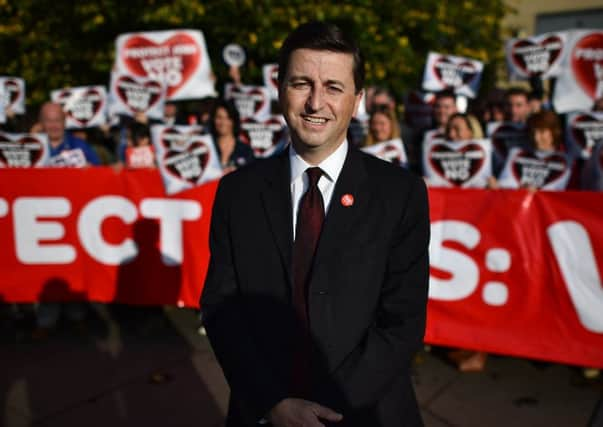David Torrance: Unionists paid price for saving UK


Exactly a year after the referendum it’s interesting to remember what some pro-independence campaigners predicted would be happening in Scottish and UK politics at this stage if there was a No vote.
Some of it has come to pass: continued Conservative rule, further austerity and renewal of Trident, but other crystal ball gazing – some might even call it scaremongering – has not. The Scottish NHS hasn’t been privatised, the Barnett Formula hasn’t been scrapped and Scotland has not, to quote Nicola Sturgeon, been “put back in its box”.
Advertisement
Hide AdAdvertisement
Hide AdQuite the reverse, as the commentator Iain Macwhirter memorably put it: “The Unionists didn’t quite win, and the Yes campaign didn’t quite lose.” Put another way, a military cliché is appropriate – the cross-party Better Together campaign might have won a decisive battle, but it failed to win the war.
The parties comprising Better Together also did their best to look like losers, with many of its generals departing the scene. Although Scottish Labour leader Johann Lamont had legitimate frustrations at her treatment during the campaign, validating one of the SNP’s attack lines by using the phrase “branch office” in her resignation speech revealed the extent of dysfunctionality inside the once all-conquering Labour Party.
And although it wasn’t immediately apparent, the referendum result, with its weakening of a once-solid Labour vote, ended or derailed the political careers of many high-profile campaigners on the Unionist side. Better Together chief Alistair Darling had long intended to leave the Commons, but colleagues such as Douglas Alexander and Jim Murphy had hopes of future ministerial office under prime minister Miliband. But on 7 May 2015 that prospect vanished with a single dramatic exit poll, and while Labour’s defeat wasn’t exclusively a consequence of the referendum, the collapse of the party in Scotland combined with English concern about the SNP pulling the strings of a minority Labour government resulted in David Cameron achieving what most assumed was impossible – an overall majority.
The fallout from that poll felled yet more Unionist big beasts. Ed Miliband and Nick Clegg resigned, while only David Mundell, the Tories’ sole Scottish MP, and Alistair Carmichael, the Liberal Democrat’s lone survivor north of the Border, lived to fight another day, and the latter in highly controversial circumstances. The former Scottish secretary’s role in leaking a controversial memo about the First Minister’s meeting with the French ambassador gave Nationalists yet another stick with which to beat scheming Unionists.
Meanwhile Jim Murphy’s energetic yet ultimately doomed attempt to save the Scottish Labour Party from a Nationalist tsunami came to a dramatic halt. His party, like the Scottish Conservatives in the 1990s, had lost permission to be heard in an increasingly hostile political climate, and risked following the same trajectory: electoral defeat compounding electoral defeat.
Ironically, the Scottish Tory leader Ruth Davidson was one of the few Unionists to emerge from the referendum campaign with an enhanced reputation (her Scottish Lib Dem counterpart Willie Rennie made the best of a bad situation), attempting to position herself between what Tories depicted as two extremes, Nationalists on the one hand and an increasingly left-wing Labour Party on the other. Yet in May 2015 Davidson demonstrated that even her humour and popularity could not overcome Tory toxicity.
Sure, First Minister Alex Salmond also fell on his sword following the referendum, but his departure was carefully contrived to benefit his party. By quitting after defeat, he deprived Better Together of victory headlines and paved the way for the rise of the Sturgeonator.
It proved a typically smart move, so while the Scottish Labour Party turned in on itself ahead of the 2015 general election, the SNP harnessed the (considerable) residual energy of the referendum campaign and kept its head. Nicola Sturgeon was the main benefactor.
Advertisement
Hide AdAdvertisement
Hide AdIt was a little-noticed irony that the network BBC, the main media bogeyman of the referendum, helped boost the new First Minister’s prestige and relevance by including her in two high-profile televised debates (having resisted doing so in 2010). Overnight the SNP became, in another irony, a party with a UK profile. Sturgeon and Salmond, meanwhile, kept the independence flame burning.
In the wake of the referendum, however, Unionists neglected the vision thing. Only the former prime minister Gordon Brown had come close to articulating a spiritual case for the Union in the closing stages of the campaign but he, departing from the House of Commons after more than 30 years, could only do so much. And had he and the former Lib Dem leader Sir Menzies Campbell actually stood in May’s election, both would probably have been heavily defeated.
Come 2020 or 2021, the dates that loom large in current SNP thinking, the Unionists will feel this weakness in personnel terms acutely. While Ms Sturgeon is likely to remain popular and be perceived as defender of Scotland’s best interests, leading Unionists will be few in number and easily depicted as defenders of an increasingly problematic status quo.
Nor is there any prospect of a united front in defence of the Union: Labour won’t work with the Tories, fearing guilt by association, and none of the Unionist parties is exactly a slick campaigning machine in a Scottish context. Interventions from Gordon Brown will be subject to the law of diminishing returns.
All of the above underlines just how unpredictable politics has become. It didn’t start with the referendum – arguably it began with a UK coalition in 2010 and an SNP landslide in 2011 – but formed part of a broader European and indeed worldwide phenomenon. Nevertheless, independence has become normalised, and for Nationalists that makes winning a second attempt in five or ten years’ time immeasurably easier.